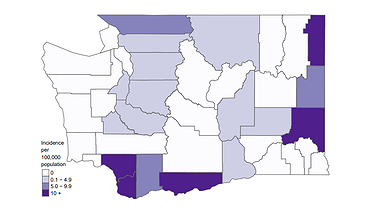Whooping cough cases surging
EPHRATA – Whooping Cough continues to have higher-than-expected case counts in Grant County and across the state of Washington according to a Grant County Health District press release. Medical professionals are asking the community to remain vigilant and take precautions to mitigate the spread of the bacteria that causes it.
“We're not seeing horribly sick people. We're mostly seeing kiddos and then the adults that live with them or care for them, and primarily they're unvaccinated or not up to date on their vaccines. Those are the people we're seeing,” said Dr. Andrea Carter, Samaritan Healthcare’s chief medical officer.
According to the Grant County Health District, there have been 43 documented cases of Whooping Cough in Grant County since June of this year. Patients have come from Moses Lake, Soap Lake and Warden and many of the patients had not been vaccinated against the bacteria that causes the infection.
Statewide, nearly 1,200 cases have been documented this year, a notable increase from the 51 cases reported as of this time last year.
Whooping Cough initially looks a lot like a cold, Carter said. In the first week, the patient may see a runny nose, low-grade fever and a mild, occasional cough.
“But then, a couple of weeks, one to two weeks after the infection, they can get more of that traditional whooping-type cough. So, it's like fits of rapid coughs and it sounds followed by a whoops (sound). It can cause some vomiting after the coughing fit is over,” she said.
Carter said she and her staff have seen an increase in cases and while the cases have been treatable, primarily with antibiotics, the increase is concerning. Most adults have either been vaccinated or can recuperate from an infection, but the concerning patient populations are infants and the elderly. Treatment is fairly standardized.
“What we typically do is an antibiotic called azithromycin for five days, and then five days of isolation until the treatment is completed,” Carter said.
Pregnant women are also considered high risk, according to the Grant County Health District.
Family members who have been exposed to the bacteria should consider vaccinating and isolating to help prevent the spread of Whooping Cough.
“When we have a case of Whooping Cough that we diagnose through testing, we offer treatment to all the primary contacts and family members that live in the home with the person that's infected,” Carter said.
While antibiotics can treat the illness, Carter and the health district both encourage getting vaccinated. Carter said the vaccination against the bacteria is long-established and safe to use and patients should make sure to get the full battery of three injections. Infants can get the vaccine at two months and boosters are required afterward to fully establish antibodies.
Carter said the main things that can help with preventing the spread of Whooping Cough are to follow good hygiene practices by washing hands regularly, covering your cough and keeping out of contact with others if you’re ill. Keeping your distance from those who are ill is also recommended.
While high-risk groups are more susceptible to dangerous Whooping Cough infections, Carter emphasized that anyone can get it and everyone in the community should be aware of the increased occurrences of the illness.
“So, if you've got it, if you’re sick, or you’ve got sick kiddos, keep them home and away from other people would be excellent,” she said. “And then careful hand washing, and if you’re around people that are coughing or sneezing, take measures to protect yourself, like leave the area.”
Whooping Cough cases:
31 WA counties have confirmed cases
Washington (total for 2024): 1,193 cases
Washington (active): 51 cases
Grant County: 60 cases
Adams County: 4 cases
Washington hospitalizations: 28 this year
Grant Co. Hospitalizations: 1 this year
Infants hospitalized statewide: 12
SOURCES: WA Dept. Of Health/Grant County Health District
 The Washington State Department of Health released a statement regarding Whooping Cough for the week of Nov. 2. The two largest groups contracting the illness are those aged one to four at 284 cases and those aged 14 to 18 with 230 cases across Washington state. The Grant County Health District is asking residents to get vaccinated for the virus to prevent further cases in the county and state.
The Washington State Department of Health released a statement regarding Whooping Cough for the week of Nov. 2. The two largest groups contracting the illness are those aged one to four at 284 cases and those aged 14 to 18 with 230 cases across Washington state. The Grant County Health District is asking residents to get vaccinated for the virus to prevent further cases in the county and state.

